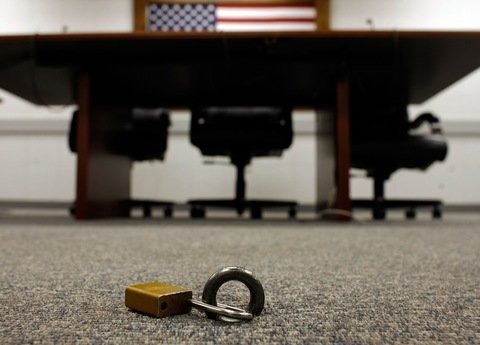
Detention facility at U.S. Naval Station at Guantanamo Bay, Cuba
As the Senate prepares for a final vote on the National Defense Authorization Act for FY 2012, battles from the early days of the war on terror threaten to derail a $662 billion defense authorization bill and bring a presidential veto.
Most of the provisions of the bill cover Pentagon programs for military personnel, weapons, the wars in Iraq and Afghanistan, as well as the Energy Department's nuclear weapons research and development. But at the heart of the controversy is language -- which has backing from Democrats and Republicans -- that requires prisoners or suspects with links to al-Qaida or involved in plots against the United States to be put in military custody, rather than being handled by the FBI, federal prosecutors and courts.
That has drawn a veto threat from President Obama and a cascade of criticism from the heads of the FBI and intelligence agencies.
The defense authorization bill advanced Wednesday when the Senate voted 88-12 to limit debate. A final vote is expected Thursday evening. Earlier, an amendment offered by Sen. Mark Udall, D-Colo., to strip the controversial detention provisions failed by a vote of 61 to 37.
The two leaders of the Senate Armed Services Committee, Chairman Carl Levin, D-Mich., and ranking member John McCain, R-Ariz., did support a provision to grant the executive branch the power to sign a waiver allowing a terrorism suspect to be tried in a civilian system. But that was not enough to remove the Obama administration's veto threat.
The White House said in a Nov. 17 statement that the provision "would appear to mandate military custody for a certain class of terrorism suspects. This unnecessary, untested, and legally controversial restriction of the president's authority to defend the nation from terrorist threats would tie the hands of our intelligence and law enforcement professionals."
The White House also objected to the possibility that the new law would apply to people within the United States: "Moreover, applying this military custody requirement to individuals inside the United States, as some members of Congress have suggested is their intention, would raise serious and unsettled legal questions and would be inconsistent with the fundamental American principle that our military does not patrol our streets," the statement said.
FBI Director Robert Mueller wrote a letter to the Armed Services Committee, detailing his fears that the change could disrupt current ongoing investigations and delay justice if the affiliation of a terrorism suspect comes into question and the Secretary of Defense is asked to move the person out of military courts.
"Building rapport with, and convincing a covered individual to cooperate once arrested, is a delicate and time sensitive skill that transcends any one interrogation session," he said in his letter. "To halt this process while the secretary of defense undertakes the mandated consultation, and the required certification is drafted and provided to Congress, would set back our efforts to develop intelligence from the subject."
On the Senate floor, proponents argued the change was necessary. Sen. Lindsey Graham, R-S.C., said that he saw no problem with military jurisdiction because "the enemy is all over the world."
"They should not be read their Miranda Rights," he said. "They should not be given a lawyer. They should be held humanely in military custody and interrogated about why they joined al-Qaida and what they were going to do to all of us."
Another section of the bill strengthens standards for transferring detainees to other countries, requiring top U.S. officials to declare that a detainee is no longer a threat.
If the Senate passes the bill, it will go to a House-Senate conference committee next week to resolve differences in their versions.
Video:
Silent Dawn of Open Fascism
U.S. Enabling Act of 2011: S.1867 (National Defense Authorization Act)

